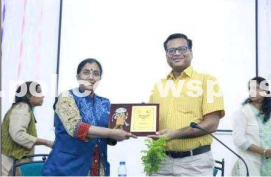One-Day Training Program Organized at Police Transport Research Institute, Bhopal
Bhopal: From July 1, the Indian Justice Code (BNS) has replaced the Indian Penal Code (IPC), the Indian Civil Security Code (BNSS) has taken the place of the Criminal Procedure Code, and the Indian Evidence Act (BSA) has replaced the Evidence Act nationwide. To address the new provisions of these laws and the procedures to be followed during investigations, a one-day training program was organized at the Police Transport Research Institute, Bhopal. This event, held on July 12 by the Women Security Branch of the Police Headquarters, featured Chief Guest ADG of the Women Security Branch, Mrs. Pragya Richa Srivastava. She welcomed the keynote speaker, Law Officer Ajaak Shri Vijay Bansal, with a plant. IG Mrs. Himani Khanna and AIG Mrs. Kiranlata Kerketta were also in attendance.
Training Provides Crucial Information about New Laws: ADG Mrs. Srivastava
ADG of the Women Security Branch, Mrs. Srivastava, addressed the police officers present, emphasizing the importance of understanding the new laws and the updated procedures for case registration and note sheet preparation. She highlighted that the training program would be instrumental in informing the police officers about these changes.
Changes in All Three Laws
The program’s main speaker, Law Officer Ajaak Mr. Vijay Bansal, explained that the IPC’s 511 sections have been reduced to 358 in the Indian Judicial Code, with all definitions consolidated. The BNS includes 21 new crimes and increased punishment limits for 41 crimes, with 62 major changes in total. Crimes against women and children are now covered in Chapter 5. The CrPC’s 484 sections have increased to 531 in the BNSS, with 177 provisions changed, 9 new sections, 39 new sub-sections added, and 14 sections repealed. The Evidence Act’s 167 sections have increased to 170 in the Indian Evidence Act, with 24 sections changed.
Sedition Replaces Treason
The new laws impose strict penalties for mob lynching, including the death penalty or life imprisonment. The treason law has been replaced, targeting actions that harm the unity, integrity, and sovereignty of India. Damaging India’s property and bombing abroad are now considered terrorist acts, with severe punishments defined for terrorism. Digital and electronic records are recognized as documents, and video-audio recordings of search and seizure processes are mandatory. Forensic experts must visit crime scenes in cases with punishments exceeding 7 years.
Emphasis on Justice over Punishment
Under the new definitions, section 2(10) includes transgender individuals in “gender,” and section 2(3) categorizes all children under 18 as “minors.” For the first time, snatching is classified as a serious crime with up to 7 years of punishment. The new laws also emphasize rehabilitation through punitive measures, community service, and counseling for first-time offenders. Senior police officers’ prior permission is required for arresting disabled individuals and those up to 60 years old for crimes punishable by up to 3 years. Victims must be informed about the investigation’s progress within 90 days of the FIR, and the right to compensation for losses is included.
Resolved Queries
During the one-day training program, attendees resolved their queries by asking questions to the keynote speaker, Mr. Bansal. ADG Mrs. Pragya Richa Srivastava presented a memento to Mr. Vijay Bansal and awarded active participants with mementos. The program concluded with ADG Ms. Pinky Jeevani expressing her gratitude.










